Great Commission Scholarship: Southeastern’s Faculty Share Their Research at ETS
Chad Burchett | November 17, 2022

On November 15-17 during the 2022 annual meeting of the Evangelical Theological Society (ETS) in Denver, CO, seven of Southeastern Baptist Theological Seminary’s faculty presented papers on a variety of biblical and theological topics.
As faithful disciples of Jesus who have been called and equipped to teach, Southeastern’s faculty are committed not only to servant-hearted leadership and excellence in their teaching and research but also to the mission of Southeastern: to glorify the Lord Jesus Christ by equipping students to serve the Church and fulfill the Great Commission.
Southeastern’s faculty are both scholars and practitioners who are involved in local church ministry, engaged in missions, and committed to discipling students. As former missionaries, current pastors, or current ministry leaders, Southeastern’s faculty have been deeply formed in the context of ministry within the community of faith. This ministry experience gives distinct shape to their pedagogies and deepens their passion to serve the Church and fulfill the Great Commission.
“What I love about the Southeastern family is that we are united in knowing that no matter what the subject or discipline, it is not only what we teach or pursue but why we do it that matters,” noted Karen Swallow Prior, Research Professor of English and Christianity and Culture at Southeastern. “We learn, study, and work, ultimately, to fulfill the Great Commission.”
It is not only what we teach or pursue but why we do it that matters. We learn, study, and work, ultimately, to fulfill the Great Commission.
This unified commitment to fulfill the Great Commission motivates Southeastern’s faculty to lead out in their disciplines and contribute scholarship that equips students and churches around the world to grow in increasing faithfulness and participation in God’s mission. One way Southeastern’s faculty accomplishes this is by sharing their research and papers at academic society meetings like ETS.
“Each year we are delighted to have our faculty presenting at ETS, leading in their disciplines and refining our perspectives on biblical and theological issues facing our Christian witness and the health of the Church,” shared Keith Whitfield, Provost of Southeastern. “Their research and presentations represent the best of evangelical scholarship and demonstrate their commitment to serve Christ with their teaching and research.”
Their research and presentations represent the best of evangelical scholarship and demonstrate their commitment to serve Christ with their teaching and research.
Southeastern’s seven faculty who presented papers at ETS this week took the time to share about their current research. In the following Q&As, read how they steward their roles as teachers and researchers at Southeastern to equip students, serve the Church, and fulfill the Great Commission:
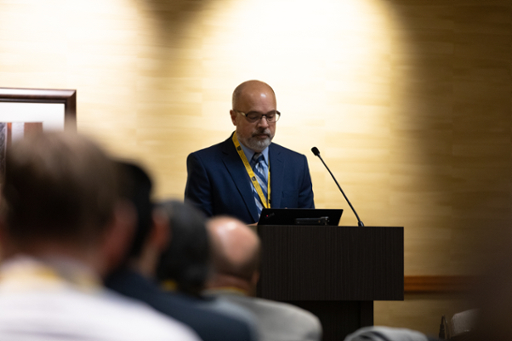
Charles L. Quarles — Research Professor of New Testament and Biblical Theology and Charles Page Chair of Biblical Theology
ETS paper title: “Questioning the Question Mark: The Punctuation of Matthew 8:7”
How does your research contribute to your discipline?
Most scholars and several leading Bible translations now argue that Matthew 8:7 is an indignant question in which Jesus rebukes the Roman centurion for expecting Jesus to defile himself by entering a Gentile home. My paper presents compelling evidence supporting the traditional view — that Jesus’s words are a gracious offer displaying Jesus’s compassion for this Gentile and his son.
What motivated you to write on this topic?
I recognized that the arguments for the new view were weak. I hope that the research will help readers understand that Jesus’s love for the nations characterized his entire ministry and did not suddenly emerge in the issuing of the Great Commission.
How does your research at Southeastern serve the Church and fulfill the Great Commission?
Careful exegesis of the Greek New Testament is crucial because even the tiniest details, like the punctuation of the text, can have important implications. My goal is to aid the Church in interpreting the New Testament accurately.
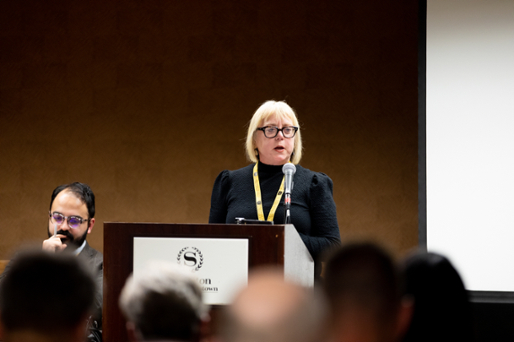
Karen Swallow Prior — Research Professor of English and Christianity and Culture
ETS paper title: “The Evangelical Imaginary and the Humility of ‘Joyful Realism’”
How does your research contribute to your discipline?
My paper will be drawn from my forthcoming book, “The Evangelical Imagination: How Stories, Images, and Metaphors Created a Culture in Crisis.” My book explores the key impressions and ingredients of the evangelical social imaginary (as I identify them) and how these have shaped the evangelical movement for both good and ill. Specifically, I apply the virtue of humility as Kelly Kapic delineates it in his recent book, “You’re Only Human,” to the role “empire” has played within the evangelical social imaginary. Empire-building, along with the imperialist practices and attitudes it cultivates, tends to be rooted not in humility but in its opposing vice, pride. In order to be virtuous, Evangelicalism (like individuals) can pursue humility by examining the concepts and images that have shaped us, testing whether this influence is truly of Christ.
What motivated you to write on this topic?
Literature and language obviously deal heavily with metaphors, stories, and images. I became interested in how these things affect our thinking, values, attitudes, and understandings because too often we conservative evangelicals, in focusing on the rational aspects of our being, overlook the powerful role played by aesthetics and imagination. We ignore this power at our peril. Marketers and advertisers certainly know how powerful aesthetics and imagination are in having an influence on our behavior! Christians should, too.
How does your research at Southeastern serve the Church and fulfill the Great Commission?
The gospel is not just a what — it is also a how. It is the truth of God spoken in love. Fulfilling the Great Commission requires us not only to tell the gospel but also to live it, to embody it, and to imagine how it can save others, too. My research in literature and philosophy helps me to think more about how people think and why they act, along with the needs they have that might be unique to their circumstances or common to us all. All this helps me to meet them where they are and show them Jesus who can transform them into who they were created to be.
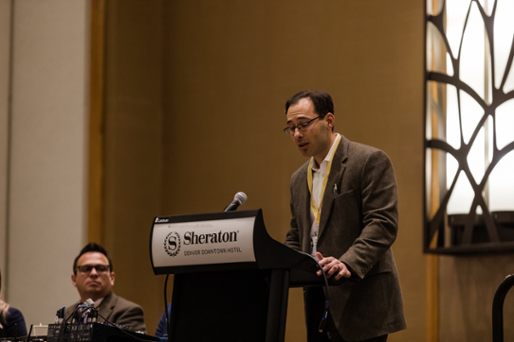
Miguel Echevarría — Associate Professor of New Testament and Greek
ETS paper title: “The Promise of Justice in Revelation”
How does your research contribute to your discipline?
One of the main problems I address is how the letter speaks to modern audiences. I came to this conclusion: that Revelation was written to “seven churches” symbolizes its significance for all churches, not just the seven in Asia Minor. What is more, its consistent inclusion as the final book in the canon signifies that it is the climax of biblical prophecy, warning us of God’s coming justice on the earth.
What motivated you to write on this topic?
When I was asked to present a paper at ETS, I thought that I was way too busy to write anything from scratch — I am teaching a full load and working on two book projects with several others waiting on me. So, I asked the session moderator if I could present a revised version of a chapter I contributed to a forthcoming volume.
How does your research at Southeastern serve the Church and fulfill the Great Commission?
One of the things I point out in my paper is that the comforts of the present age are enticing — like power and wealth and the compromises people make to attain them. I would like my students to forgo such snares and traps and have a singular focus on aligning themselves with King Jesus.
I put forth my best effort in teaching and writing to prepare students to serve Jesus in their various callings. After all, King Jesus demands my excellence in the classroom and scholarship. And as I remind students, he also requires their excellence. No half-baked effort will prepare them for lifelong service to Jesus.
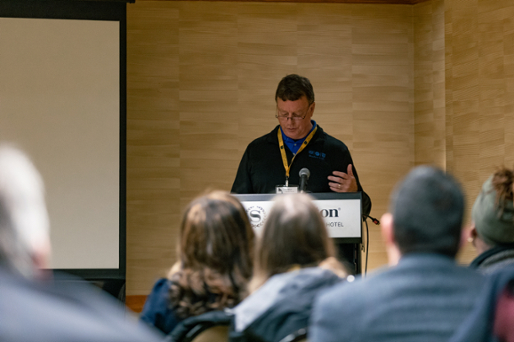
Mark D. Liederbach — Senior Professor of Theology, Ethics, and Culture; Dean of Students, and
Vice President for Student Services
ETS paper title: “An Ethical Exploration of The Gospel, Just Holiness, and Social Engagement”
How does your research contribute to your discipline?
Because God is the beginning of all things, the center of reference for all things, and his glory is the final purpose of all things, ethics must be understood in terms of worship. Subsequently, the pursuit of justice, so far as it pertains to ethics, must take place in reference to him. Understanding justice must begin with him, always center on him, and ultimately be concerned that he is magnified and maximally worshiped. From this theocentric perspective, the pursuit of just holiness involves the alignment of all things to God in accord with his eternal plan.
The purpose of this paper is to explore the concept of justice as it pertains to the field of ethics with particular focus on understanding how a biblically and theologically grounded notion of justice must first of all be theocentrically understood; must result in holy living; and subsequently, must also impact how we understand and pursue social engagement.
What motivated you to write on this topic?
The single greatest injustice in human history — indeed, in the history of the universe — is that God does not receive the worship he is due. This is true as it relates to each and every living human being. It is true as it relates to all human beings together. Given the special role humans play in the created order, it is also true of the entire cosmos. This is why we must address the topic of justice both in terms of its personal implications as well as its social aspects. God’s majesty demands it, and the prospect of human flourishing desperately needs it.
How does your research at Southeastern serve the Church and fulfill the Great Commission?
The research, writing, and teaching I do in the field of ethics is all catered to and focused on training students to engage the most pressing issues of our time with the eternally true message of the gospel in a manner that is both culturally timely and apologetically effective.

Christy Thornton — Assistant Professor of Christian Thought, Director of the ThM program, and Associate Director of the PhD program at Southeastern
ETS paper title: “Separable Operations?: A Trinitarian Critique of John Gill’s Theology of Baptism”
How does your research contribute to your discipline?
I am currently working to help Baptists think better about how we observe baptism and the Lord’s Supper and, in particular, help Baptists come to our observance of the ordinances with an expectation that God is at work while we observe these practices. One of the things that we have to do, then, is to consider how Baptists in the past have answered these questions.
What motivated you to write on this topic?
I wrote about John Gill because he had a fair amount of influence in the past and continues to have an influence today. I came to my research with the question, “How does John Gill deal with God’s presence in baptism?” As I was doing research, I discovered that he neglects it at some points and makes a Trinitarian misstep in the process. I hoped that addressing these matters could be instructive for contemporary Baptists as well so that we do not make the same errors that he made by failing to recognize the significance of the Spirit’s present act while we are observing baptism.
How does your research at Southeastern serve the Church and fulfill the Great Commission?
In terms of the Church universal, I am helping other Christians think about Christianly practices like baptism and the Lord’s Supper, and that is also a service to Christians in the academy who are stewarding gifts of knowledge to equip us all to better serve our local churches. At the local church level, I hope that this research can equip pasors to help their congregations enter into this defining Baptist ordinance of baptism with an expectation that God is at work. Baptism is not just a rote activity that we do; he is doing something in and through us when we observe these God-ordained practices.
The Great Commission is central to this research because the Great Commission tells us to go and make disciples and baptize them in the name of the Father, Son, and Holy Spirit. So, when we think about accomplishing the mission, it has to include an understanding of what baptism is. As we make disciples, we lead them in the expectation that baptism is more than a mere act of rote obedience. It is also a God-ordained practice for his Church to grow up into the maturity of Christ. Something significant is happening when we do this and are baptized in the name of the Father, Son and Holy Spirit.
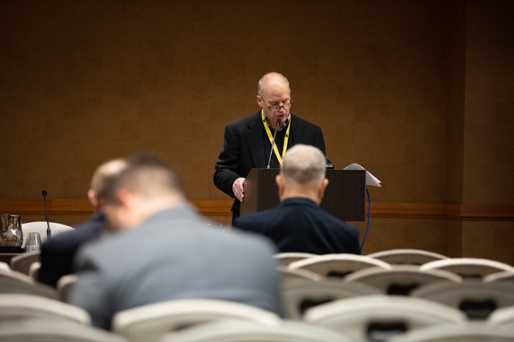
Ken D. Keathley — Senior Professor of Theology, Jesse Hendley Endowed Chair of Biblical Theology, Director of the L. Russ Bush Center for Faith and Culture
ETS paper title: “Would Bonhoeffer Think We Were Stupid?”
How does your research contribute to your discipline?
My paper deals with epistemological virtue as it relates to social media and toxic populism.
What motivated you to write on this topic?
Evangelicalism has always been a populist movement. This is good and commendable in many ways because it entails an egalitarianism, activism, and entrepreneurialism that enables Evangelicalism to be agile and responsive. However, these populist traits also have a downside, even a dark side. My paper identifies and cautions against those darker impulses.
How does your research at Southeastern serve the Church and fulfill the Great Commission?
Evangelicals are central players in the political arena and public square. We have the opportunity and responsibility to represent Christ well. Thinking carefully about the issues and engaging winsomely with those with whom we disagree are traits of academic rigor and epistemic virtue. My hope is to model these emphases well in whatever venue or classroom I am in.
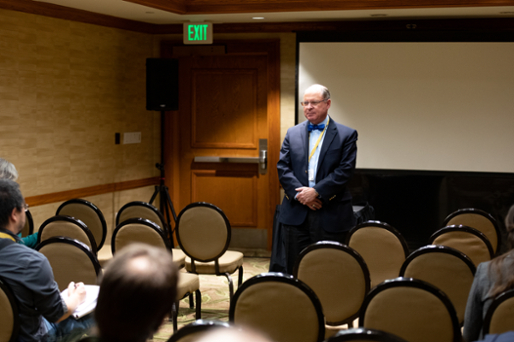
Daniel R. Heimbach — Senior Research Professor of Christian Ethics (Retired)
ETS paper title: “Faithful Communicating: Solving the Self-Consistency/Neighbor Love Divide in Truth-Telling”
How does your research contribute to your discipline?
Bible-believing Christians throughout history have been divided between two positions on how best to interpret the truth norm revealed by God in the Bible. This paper argues both of these positions is partly right and partly wrong and offers a third position, holding that what God requires is a God-centered interpretation of truth-telling. No one disputes that God is the God of truth, is himself perfectly true, and requires us to be true in all we say and do. However, what norm does God require when it comes to communicating truly? The early church held to a neighbor love interpretation, and Augustine later rejected it arguing the Bible instead requires consistency between what a person thinks and says. I will argue that what God requires is “faithful communicating” and that the truth norm revealed in the Bible is God-centered rather neighbor-centered or self-centered.
What motivated you to write on this topic?
I cover this topic at length in the new textbook I have written for seminary courses dealing with Christian ethics: “Fundamental Christian Ethics.” My paper this year will give other ETS members a taste of what to expect. What I cover in this paper and in the book breaks a stalemate in Christian ethical thinking regarding how best to interpret biblical revelation concerning the ethic of truthfulness required of true believers in Jesus Christ.
How does your research at Southeastern equip you to serve the Church and fulfill the Great Commission?
My field is Christian ethics, and Christian ethics is essential to the Great Commission at every level. Christian ethics frames, equips, and explains the Great Commission: first, because sin is the ultimate ethical problem of humanity separated from God; second, because salvation is the ultimate ethical solution overcoming the problem we have; and third, because glorification is the ultimate ethical end state for which we were created and saved.
The problem I deal with in this paper in particular is highly relevant to taking the gospel into hard-to-reach areas where new believers are persecuted and missionaries are denied entry, expelled, or even imprisoned simply for being true to Christ and preaching the word of God. God’s word is true, but the Devil and the world are very strongly opposed. Jesus warns that, when shining light in darkness, we need to be not only innocent as doves but also shrewd as serpents. My research on the truth norm aims at helping Christians to fulfill the Great Commission in ways that are innocent and shrewd at the same time.